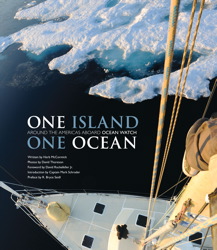 Alarmed by the condition of the world’s oceans, Captain Mark Schrader and a group of friends set upon an idea to organize an extended educational voyage to “raise awareness in meaningful ways and change behavior.” Schrader, a veteran solo ocean circumnavigator, began the intricate process of making the challenging voyage a reality. One Island, One Ocean by Herb McCormick chronicles and illustrates the epic journey of the first-ever continuous circumnavigation by sail of the American continents.
Alarmed by the condition of the world’s oceans, Captain Mark Schrader and a group of friends set upon an idea to organize an extended educational voyage to “raise awareness in meaningful ways and change behavior.” Schrader, a veteran solo ocean circumnavigator, began the intricate process of making the challenging voyage a reality. One Island, One Ocean by Herb McCormick chronicles and illustrates the epic journey of the first-ever continuous circumnavigation by sail of the American continents.
Outfitting the steel cutter Ocean Watch involved more than just preparing the vessel for the rigors of sailing 25,000 nautical miles through rough seas over a 13-month period. It also entailed installing analytical equipment, computers and the myriad equipment to meet the needs of the various disciplines to observe, record and report findings.
The core crew of four were joined by educators, scientists, an oceanographer, a photographer and other guests who supported and added talent to the voyage. Critical roles were also played by various partners, contributors, educators, scientists and other practical shore support.
The book’s photography is impressive with exquisite details of the journey, starting in Seattle, circling the Americas, and back to Seattle. The documentary is written in four parts: “North to the Ice,” the ship sails north from Seattle to Newfoundland via the Arctic Circle and Northwest Passage. Next, the “The Long Slog South,” the ship crosses the equator sailing from the Canadian Maritimes to the Falkland Islands. The third part, “Cape Horn to Starboard,,” celebrates the triumphant rounding of the Horn and a sobering passage through Patagonia. Finally, “Closing the Circle,” a Pacific passage where they encounter El Nino, the Baja Bash where they endure extremely rough weather, the Golden Gate and finally, home to Seattle.
Their findings? Fisheries are being shamefully depleted. Coral reefs are being diminished. Plastic and chemical pollutants are clogging and poisoning life-giving oceans. Ocean acidification is jeopardizing all sea life. The remedy? R. Bryce Seidl, Pacific Science Center President and CEO, who wrote the Preface for One Island, One Ocean says, “The degradation of the oceans is the result of billions of us doing small, largely inadvertent things that in their totality are hugely damaging.” Conversely, billions of us making small changes in our lives can result in positive influences on our oceans.
One Island, One Ocean documents the importance of ocean conservation. Captain Schrader also lectures and presents a slide show, which we were fortunate to attend. Both the lecture and the book leave lasting impressions. Our oceans are changing for the worse which will eventually affect human life on the planet. The decline, both chemical and physical, are visible and measurable in virtually all of the world’s oceans. It is clear: We must take steps to reverse this environmental damage.

